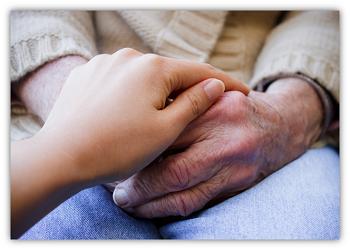Service
Service

The Diaconate⤒🔗
The congregation of the Lord is called to service, service to God and to it's neighbour. Christ's life was a life of service to sinful and poor people. A Christian is called to dedicate his life, following Christ's example, to service. In the Greek, the language of the New Testament, the word "service" is diakonia. This word contains the origin of our words "deacon" and "diaconate".
The diaconate is a very important facet of the life of the church. It is the social help and service to those who are in need. He who has been called and installed to this particular service, should contemplate how the congregation and he himself should exercise the calling to deaconal service.
The congregation precedes the deacon. The church fist existed without deacons, with the congregation mutually in Christian love, exercising this Christian calling. With the installation of deacons this task was not abrogated, but focussed and organized. The church of God benefits from order. Deacons are called to leadership in the area of Christian charity. They should have a natural generosity and a special ability to detect needs in the congregation.
A worship service without the work of the deacons is unthinkable. The proclaiming of the Word of God is deaconal in nature. It is the proclamation of the serving and charitable actions of God through Jesus Christ.
Deaconal work is thus an extension of God's work to us and is done in His name in the congregation through the congregation's officer bearers, the deacons. The office of deacon is, therefore, not less important than the office of elder, but it is different in nature. Both have as only purpose: Christian service to the congregation.
The deacons collectively comprise the diaconate. This body can only function properly if proper organization is applied. Are proper meetings held, which are opened with Scripture reading and prayer? Or do we merely chat and count money? Are deaconal decisions recorded? Responsibilities have to be allocated. Not everyone can be responsible for everything. We have to distinguish the gifts of each deacon. The one will be a good administrator and another will be able to communicate well with the elderly.
The Diaconate in the Congregation←⤒🔗
Real poverty has become almost extinct. Hunger is unknown. The social infra-structure diminishes the need for deaconal support and consequently the danger exists that the diaconate could fall asleep on the job. But often silent needs may be detected which are of an incidental (and sometimes even permanent) character.
The first priority of the diaconate is its own congregation. Deacons have to know the congregation well. They have to listen carefully with a "deaconal" ear. Does he detect special needs? There is not congregation without needs. Perhaps deacons assume needs do not exist because they do not know about them.

Christian charity is the most important task of the, deacons. Sometimes we feel a hard and stingy attitude in a congregation (which may even affect the diaconate), where the first responsibility seems to be to keep all diaconate funds in the bank account, and as real defenders of church funds, only to part with these precious dollars in cases of extreme need. Deaconal funds must be given with joy! The Lord has opened a way where the congregation, through the deacons, may share and help! Deaconal funds must be accepted with joy! The Lord has provided through His Church! Deaconal contributions often have an unchristian stigma attached to them. People whisper, "I think they are receiving from the deacon fund". Rather, the members of the congregation should alert the deacons to possible needs to inquire about, after you have, where possible, done your Christian duty. As congregation, we have to see the work of the diaconate spiritually, as the Lord caring for His church.
Deacons should not only be active in Christian charity, but also be prepared to assist congregation members in the labyrinth of social programs available to those who have needs. A deacon (or deacons) should make it his work to familiarize himself with these and make his skills available to the elderly, handicapped and others, who are unable to deal with government bureaucracy in obtaining financial assistance. Article 26 of our Church Order reads (in part):
The deacons shall enable the needy under their care to make use of Christian institutions of mercy ... They may also seek mutual understandings with other agencies in their community which are caring for the needy, so that the gifts may be distributed properly.
Deacons should think of special needs which may be there in some families after the birth of a child. Is the mother again able to resume her work at home? Who can help, if not? In the first instance, relatives or the congregation should. Sometimes this is impossible (distance?). Who will pay for professional help if required? Can the family?
The diaconate also has a particular responsibility for the elderly. The elderly have special needs. When a widow(er) is in frail health, who will do the shopping? Who will shovel the snow? The deacons can organize these and other services when require with the aid of, for instance, the young people of the congregation.
Deacons can also assist in arranging old age home, nursing home or hospital entry for those who require these services and do not have other assistance.
Deacons are called to service to the handicapped. They can organize meetings, visits, vacations and make it possible for them to attend worship services.
Deacons work with young people and pay special attention to youngsters who are from a one-parent family, but also to the young unemployed, the addicted, whether to drugs, smoking or alcohol.
Deacons will, in their organization of Christian assistance, especially involve the young people; showing them how valuable their Christian charity is to their fellow member, and restore a sense of purpose to those young people who flounder aimlessly at the fringes of the church.
A deacon is one who serves, one who points to service, one who leads to service. A deacon can stimulate the love for Christian service in the families of the congregation. A deacon can stimulate the choice of those professions which serve: nursing, medicine, etc. Deacons should ask for and stimulate financial support for diaconal causes and projects.

Deacons should have special attention for the sick. Sick members should be visited. Deacons should remember that all serious illness also has financial repercussions in the family. Have special needs resulted? Can they be met? Can the members of the family attend church if the only driver is in the hospital? Can the deacons organize transportation?
Deacons do all of the above, but they are not social workers. They do this work for the Church, and thus for the Lord, and on behalf of the Lord. Their charity will have to be Christian. Not only in motives, but especially in application. Church Order (article 25) says: "That their duty is to visit and comfort the distressed".
Snow shovelling, filling out forms, visits and financial help are of diminished value if not accompanied by the Christian comfort. The dispensing of diaconal service is only truly diaconal when spiritual comfort is present with the aid given.
But firstly, the work of the deacons is the duty of every member, as it was in the first Christian church. A congregation sees her Christian calling, when there is very little work for the deacons to do, because there is love and care for one another.

Add new comment